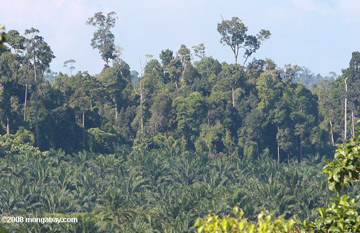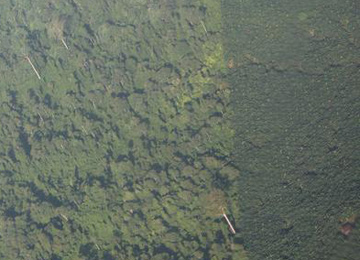Malaysia says no more clearing of forest reserves for oil palm plantations
Malaysia says no more clearing of forest reserves for oil palm plantations
mongabay.com
June 26, 2008
Update: Sarawak to continue logging forests for oil palm plantations
|
|
The Malaysian government said it will prohibit forest clearing for the establishment of oil palm plantations. Only areas zoned for agriculture will be allowed to be converted for palm oil production.
In comments reported Wednesday by the New Straits Times Online, Malaysia’s Prime Minister Datuk Seri Abdullah Ahmad Badawi said Malaysia will encourage the use of existing agricultural land for oil palm expansion.
“We don’t have to reduce the protected forests to increase new oil palm plantations,” Abdullah was quoted as saying. “With more effective management of the plantations and new technologies, production can go up by 30 per cent.”
“There is still land available for agricultural expansion. There is no need for permanent forest reserves to be used for this purpose. The government in any case will not encourage deforestation to obtain more land for agriculture,” added Datuk Chin Fah Kui, Plantation, Industries and Commodities Minister. “But land currently designated for agriculture or not utilized for the planting of specific crops, can be converted for the cultivation of oil palm.”

|
Malaysia has been working to improve the image of its palm oil industry in response to criticism from green groups who say plantation expansion has come at the expense of biodiverse natural forests and can result in significant greenhouse gas emissions when established on carbon-rich peat lands. In April the Malaysian Palm Oil Council held a sustainability conference to look at some of the environmental issues surrounding palm oil production. The conference highlighted some of the measures firms are taking to reduce pollution and greenhouse gas emissions, including treating palm oil mill effluent, replacing chemical pesticides and fertilizers with natural predators and composting techniques, and setting aside forest reserves in riparian zones and hillsides. It also noted that oil palm is presently the world’s most productive oilseed with a carbon balance favorable to other oil crops including rapeseed and soy.
Nevertheless some environmental groups have expressed concern that as Malaysia improves the environmental performance of oil palm within its borders, Malaysian firms have lower standards when operating in neighboring Indonesia where much expansion is taking place. Deputy Prime Minister Datuk Seri Najib Tun Razak said Wednesday that Malaysia — the world’s second larger producer of palm oil after Indonesia — has already acquired land in Papua, Kalimantan, Aceh and Brazil for future expansion.
To help allay these fears, some producers have banded together to form the Roundtable on Sustainable Palm Oil to establish environmental standards for the industry. Unilever, one of the world’s largest buyers of palm oil, said in May that aims to have all its palm oil certified as eco-friendly by 2015.
Related articles
Will consumers pay 10% premium for sustainable palm oil?
(5/21/2008) The first shipments of certified eco-friendly palm oil will arrive in Germany during the second half of 2008 according to the head of OVID, a German edible oil industry group.
Indonesian palm oil firms pledge to stop clearing rainforests
(5/13/2008) Palm oil companies operating in Indonesia pledged to stop clearing forests for new plantations reports The Jakarta Post. The move is a response to growing criticism that oil palm expansion is destroying biologically-rich rainforests and contributing to global warming.
Palm oil boycott an unrealistic approach to conserving biodiversity
(4/15/2008) Boycotting palm oil produced in Southeast Asia in an “unrealistic” and “ineffective” approach to conserving the region’s fast-disappearing rainforests, said a Princeton University researcher speaking at a conference on the sustainability of palm oil. Instead, NGOs should focus on engaging and working with the palm oil industry to reduce its impact on the environment. Addressing the first International Palm Oil Sustainability Conference in Kota Kinabalu, Malaysia, Princeton biologist Dr. David S. Wilcove said that the palm oil industry is too important to the economies of Indonesia and Malaysia to justify blanket import bans on the edible oil used in food, cosmetics, industrial products, and biodiesel. The palm oil industry contributes to health, education, and infrastructure in rural areas.
Eco-friendly palm oil could help alleviate poverty in Indonesia – Palm oil is not a failure as a biofuel
(April 4, 2007) The Associated Press (AP) recently quoted Marcel Silvius, a renowned climate expert at Wetlands International in the Netherlands, as saying palm oil is a failure as a biofuel. This would be a misleading statement and one that doesn’t help efforts to devise a workable solution to the multitude of issues surrounding the use of palm oil.
